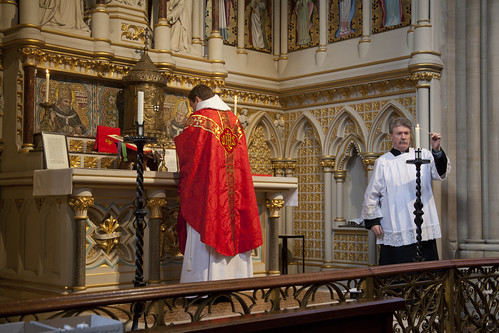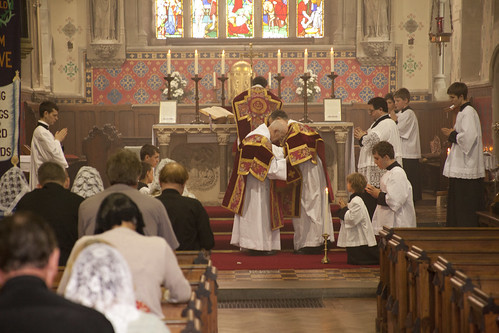 |
| What is this priest doing? Simply praying, silently, at the Altar. (Dominican Rite.) |
Guide to this series:
Part 2: The
Liturgical Movement
Part 3: Falling
between two stools
Part 4: Novus
Ordo in Latin?
Part 5: 1965?
Over at the New Liturgical Movement, Peter Kwasniewski has done a very good post drawing together several recent posts from priests associated with the Reform of the Reform. What Fr Thomas Kocick, Fr Mark Kirkby, and Fr Hugh Somerville-Knapman all say is that, having been committed to this great project of the 'Reform of the Reform' of the Novus Ordo, they have come to the conclusion that it doesn't work. There are fundamental difficulties with the Novus Ordo which make it impossible.
To clarify: what is the RotR and what were they trying to achieve? By saying the Novus Ordo with as much reverence as possible, and by using the most traditional options available, such as Latin, celebration ad orientem, and so on, they hoped to create a liturgical experience with more in common with the Traditional Mass. They looked forward and called for (in a long succession of books) to changes in the Missal which would allow even more traditional options (such as the old Offertory Prayers), and even the suppression of some decidedly non-traditional options (such as some of the new Eucharistic Prayers). They even looked forward, sometimes, to a merger of the two rites, in some kind of compromise missal. The point of the exercise is to bring back to the celebration something which is too often absent from the Novus Ordo, and something noted by Pope Benedict as a characteristic of the Vetus Ordo: sacrality, a sense of the sacred.
I recommend readers to look at the NLM post to review the arguments, and the very interesting comments. I'm not going over again what is said there.
I have in the past pointed out the practical, pastoral problem of the RotR: far from it being, as its proponents ceaselessly claim, easier to foist on a parish than the Traditional Mass, it is harder. The argument is simple: if a priest gets rid of the Altar girls, moves the Altar round to celebrate facing East, and introduces some Latin, in the typical parish Novus Ordo, he will create a civil war in the parish which he will almost certainly lose. If he introduces a Traditional Mass in a new time-slot, he may blot his copy-book with a hostile Dean and Bishop, but he will very probably get away with it in the short and medium term. (In the long term, of course, he may be moved.) This has been confirmed over and over again. Many of the commentators over on the NLM need to free themselves from their illusions on this. RotR is not the easy option.
But I want to introduce another idea. While I am in favour of Latin, worship ad orientem and pretty well everything the RotR promotes, it is clear to me that the difficulty of imposing them on the Novus Ordo is not just a matter of parochial habits. The problem with the texts and ceremonies, in terms of bringing them closer to the Traditional Mass, is not just a matter of how many changes you would need to make. The problem is that the Novus Ordo has its own ethos, rationale and spirituality. It encapsulates its own distinct understanding of what liturgical participation is. It is to promote this kind of participation that its various texts and ceremonies have been done as they are. If you put it in Latin, ad orientem, and especially if you start having things not currently allowed, like the silent Canon, then you undermine the kind of participation for which the Novus Ordo was designed.
This means that there is a danger, in promoting something which amounts to a compromise between the two Missals, of falling between two stools. I will put some more details on this bare-bones suggestion in my next post.
 |
| What are they doing? Performing a noiseless ceremony symbolising the Peace of Christ and mutual reconciliation. The schola is singing the Agnus Dei. The congregation watches. |
I went to Mass in Spanish the other day, and it made no sense as the vernacular is English for everyone there. Sure, there were a few native Spanish speakers including the priest, but he didn't even know the Spanish prayers as comfortably as he needed to. In fact, it was much worse than the first Low Mass I assisted at because at least then I could sit and pray, rather than be expected to participate with all the responses. The ability to change everything on a whim including a language one isn't supposed to know (we should know the Latin according to SC and our own vernacular language) makes the RotR very difficult and it indicates the minds of the reformers and their beliefs on the theology of the Mass.
ReplyDelete